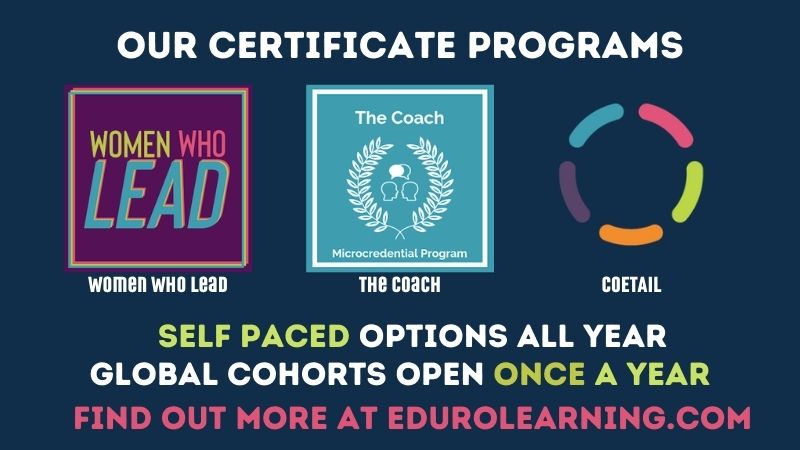In this #coachbetter episode, Clint and Kim chat with Carla Marshall, Director of Teaching and Learning at United World College, Southeast Asia, East Campus. This was a fascinating conversation about change management in an educational context, a critical skill for all coaches. They talk about the importance of taking a systems approach as a school leader and change agent, the ways that both Cognitive Coaching and Instructional Coaching are part of the professional learning culture at UWC, and the ways that coaches and school leaders can leverage micro-changes to create large scale ripple effects. For coaches looking to better understand the leadership aspects of their role, this episode is essential listening!
Subscribe to #coachbetter via your favorite Podcast Player!
Featured Guest

Bonus! Watch the Spotlight Version on YouTube!
Show Notes
About Our Guest
United World College, Director of Teaching and Learning at East Campus (Singapore). 5 years in Singapore, Hong Kong, Switzerland, Germany. Co-author of Concept-Based Inquiry in Action: Strategies to Promote Transferable Understanding. www.connectthedotsinternational.com
What are you excited about in terms of learning / learning innovation ?
Taking a systems approach – thinking about how things are connected. Thinking about design thinking process. Stakeholder interviews with teachers in different parts of the school. What’s something we want to keep & protect and why? What’s something we might want to change and some reasons? What are some recommendations you can make?
Hearing individual stories and the way that they’re interacting with school life. The theory and practice come together and coalesce. A bit like a mosaic like a piece of glass they put on the table making patterns and trends. Anyone who wants to talk.
Also: shadow a student challenge: grade 2, grade 6, grade 12. Focus groups with students. It’s not just one thing, lots of pieces of data to triangulate.
Change management is not just about change, it’s also about stewarding. Strong culture of Cognitive Coaching, feel like it allows them to engage in dialogue with their colleagues. Collaborative culture where teams can work together. Building blocks to maining.
Fully articulated K-12 concept-based curriculum written in-house. How do we make sure we have those links to bring subjects together so that students are not thinking in discrete siloed conditions?
It’s about managing pulls trying to get you to make decisions quickly. Giving yourself the permission to say “I’m new but I’m not new” – I need to make sure to understand the system enough to understand the interactions. Earmark that listening to people in a deep way to understand their perspectives is also work, just as much important as “decision making”. How can I support people in doing things they’re already doing already better – not at the start of the year? Where might there be leverage points to support those things to an even greater extent?
Advice for coaches
Relationships, being visible, demonstrating that you’re prioritizing listening, allows you to make better recommendations. Making sure that you’re meeting people where they’re at, asking them where they want to go, and being a partner in that journey. Don’t want agency to be taken away from them. How can I make sure people have that sense of agency, so I can be a lightening rod for their ideas? Even though I have my own ideas, I kind of have to dampen that, so they feel supported.
What’s your relationship with Cognitive Coaching & the structure of coaching at UWC?
Cognitive Coaching is a really important skill set, to engage in dialogue. Moving through the iceberg: what’s visible to under the water / hidden? All types of different coaches (literacy, etc) coming together. K-12 coaches meeting is about the craft of being a coach. How can we build upon each other’s strengths?
Instructional Coaching vs Cognitive Coaching at UWC
Impact study of CC at UWC: CC is just as much about culture building as it giving people a skill set to engage in dialogue as well as self-actualize in terms of the way they want to move forward. IC is different, much more looking at the students and the goals for them. Can have a CC without talking about students, it’s about you and your efficacy as an educator. Not looking for evidence from students as much as you would with IC. The goal is slightly different, but both can be supportive of the over-arching goal of collaboration, culture building, and agency.
Important to be clear about when you’re doing one vs the other. Important for people to have a frame around that thinking so people don’t get whiplash trying to figure out the purpose. What’s the purpose of this conversation, therefore what tools might we use to get us to the outcome?
How can we help school leaders understand the value of coaching?
Coaches need to coach leaders to understand coaching. Creating principals of coaching and share with school leaders. If coaches feel like they don’t have that sense of clarity within their schools, find the way to think at the level of the “why” rather than the what or the how. Why do coaches exist in this environment, what is their role, and do that with leaders if possible. If not possible with leaders, do it as a group and collaborate on the document.
Potential uncertainty is an opportunity. The power of coaching should be just as powerful in every school. If you don’t articulate the potential, you run the risk of diverging approaches that butt heads with each other.
New to coaching: deep listening: ask teams what needs are, and where the gaps are, can give insight into pedagogy. Not isolated, working within a community and thinking about it as a community based approach, drawing out patterns from what you’re hearing will give you a place to go. Filling in the gap between we have a need, and what those needs are, and how those support the vision and mission of the school.
What is the most innovative (or challenging) experience in your career that is having an impact on your professional growth?
First international school experience was only 3 years old. Quite a few board issues, differing opinions about how the school should be led. Founding principal was asked to leave mid-year. Had to move into interim principal position. Morale was very low. Lack of policies and structures. Can look at those as opportunities, or woe is me. I learned an extreme number of skills in a very short amount of time. Support culture and morale of the team. Focus on teaching and learning even with so many structural challenges.
Foundational for me in positioning myself as an agile individual. How do you work with flexibility and agility in those tight moments. Things don’t stress me out as much as they could.
Thinking in Systems by Donatalla Meadows: If you want to improve systems, what are the mechanisms? How do you change people’s paradigms about education to transform things above the surface like individual lessons? What are our values, whether they’re explicit or tacit? How can we unearth current thinking? How do we make sure we can update those with our current thinking if they’re not already in our foundational documents? What does our documentation say that we value? How does that align with our coffee talk? What mental models align?
Interactions / Relationships: connections between nodes. You can’t ever understand a system 100%, it’s dynamic and the pieces are always moving, creates a slightly different system. Trying to get an intuitive sense of what that system is like, understanding varying pockets of that system, and noticing emergent properties that are coming up. You can only see what a system is, by changing a system. Need to start with micro-changes, see the feedback, then go to a slightly larger version and see the feedback.
Who are your advocates that can be creating those micro-changes, and provide a ripple effect? One way to influence change without disrupting the system in a way that people feel the rug has been pulled out from under them. How do you balance that need for equity with these micro-changes?
Resilient systems are often more diverse systems. Promoting diversity of practice is a balance of not wanting to create robots (where everyone is doing the same thing in the classroom, because you want autonomy that creates diversity and innovation), but that needs to come hand in hand with conversation around what are the success of those things and determining what things we want to scale. Need to have opportunities for cross-pollination in the system. Diversity promotes resilience of the system, at the same time you need systems in place to synthasize great opportunities.
Iterative cycle in the school: Play, Explore, Decide: play: think about possibilities, explore: deepen understanding, decide: now we make a decision. Explore can use: What are the criteria we would use to determine what we keep.
Please share a reading or resource you have explored recently that you think would be valuable to other teachers or coaches
Becoming a Globally Competent Teacher. Has quite a few scales inside to help you move from beginning to progressive to proficient. “You teach what you are” – you will bring that to you work experience. You have to check that identity at the door, and be aware of it. Thinking about how you can move towards the aspect of the scale int erms of






Recent Comments